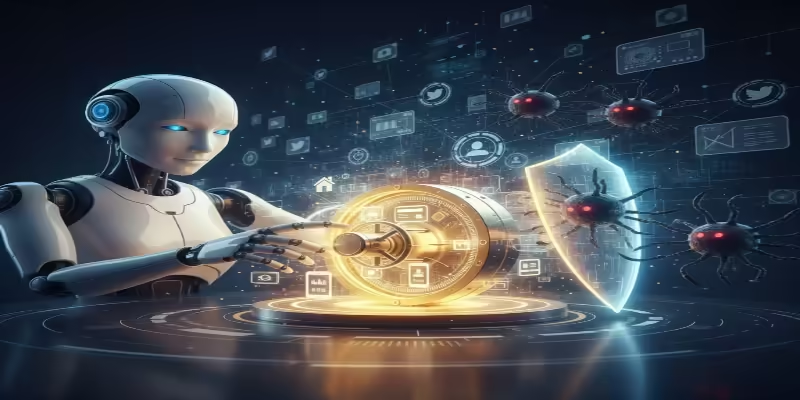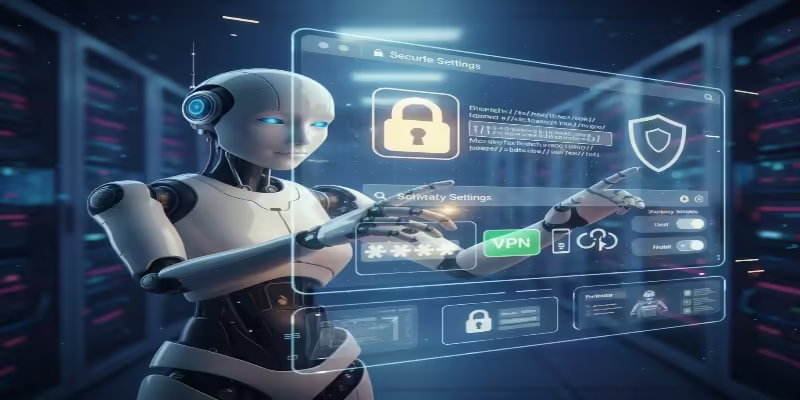The Importance of Data Privacy in a Hyper-Connected World
Nearly all the things we do are kept as records, for instance, clicks, scrolls, and taps. Technology is deeply ingrained in our lives, starting from the use of smart home devices, going through social media apps, online shopping, and digital banking. While this hyper-connectivity has elevated our world to be more efficient, convenient, and engaging, it has also been a double-edged sword in that it has revealed a new and increasing danger to us all: the loss of data privacy.
Every day, tons of PII (personally identifiable information) such as names, addresses, bank details, browsing habits, location data, and much more are being sent over the internet. Although this data is what keeps the digital services alive that we consume, it is still a risk door to data being misused, stolen, or hacked. Hence, as our digital identity is becoming a reflection of our personality, safeguarding it is no longer a choice; it is mandatory.
This blog will discuss the significance of data privacy in a hyper-connected world, the impact of digital identity on our online presence, and the most trustworthy methods of securing your personal data in a digital landscape that is increasingly more vulnerable.
Understanding Data Privacy
Data privacy refers to the right of a person to control the sharing, collecting, and usage of their personal data. Simply put, even if it is your online communication or medical records, no one should be able to share or access your information without your consent.
Simply put, data privacy is the individual's right:
The Right to Know- An individual must be informed about the types of personal data that are being collected.
The Right to Choose - the individual should be allowed to decide how the data is to be used.
The Right to Control - the individual should be permitted to authorize the people who can have access to the data.
Despite this, the proliferation of applications, sensors, and digital platforms has virtually negated the possibilities of controlling power. Take, for example, the case of web browsing or online shopping. Your data can be harvested and utilized for advertising, studying, or any other purpose without your agreement.
Why Data Privacy Matters More Than Ever

1. Your Personal Data Is a Valuable Asset
It is often said that data is the "new oil" of the digital era. Every demand is made by corporations, states, and cybercriminals to get their hands on it. Your online activities, like the websites you visit, what you do online, and even the words that you say to your electronic gadgets, can reveal who you are, what you like, and what you think.
For example, in exchange for your data, you can receive more relevant ads to your interests, allowing companies to get more customers or improve their products/services. Nevertheless, if this information is stolen by someone else, they can do the following: steal your money or manipulate you digitally.
2. Growing Cybersecurity Threats
The more connected we are, the more exposed we become to cyberattacks. Cyberattackers are continually coming up with new methods to access personal information. This ranges from fake emails done in the style of well-known brands to enormous data breaches where a huge number of records are leaked.
The average global business cost of data breach incidents was more than $4.5 million per event in 2024, according to IBM’s report. Identity theft's emotional and monetary toll on people can spiral to unauthorised activities and low credit scores, among other things.
3. Loss of Digital Identity
Our digital identity, all online things that define us, is equally as important as our physical identity. It is also made up of social media profiles, e-mail accounts, biometrics, and digital signatures. Take away the control of it, and it's like taking away a part of yourself.
If stolen, your digital identity may be used to masquerade as you, make fake transactions, or distribute lies. It is difficult to regain a stolen digital identity as completely as it is for a lost wallet.
4. Erosion of Trust
Trust is at the core of the digital economy. A user is empowered by trust when purchasing goods online, sharing intimate photos on social media, or simply using a healthcare app that the information is kept safe and will not be exposed to unauthorized parties.
On the other hand, if companies fail to take good care of customer data, they will lose the trust that the users have in them. Incidents like Facebook, Equifax, and others have frequently played the part of illustrating how user confidence and trust can be quickly shaken and remain shaken for quite a long time after only one event.
How Hyper-Connectivity Amplifies Privacy Risks
 Our "hyper-connected" world of today means that our personal data is continuously moving from one place to another and being collected, analyzed, and stored in different networks and devices.
Our "hyper-connected" world of today means that our personal data is continuously moving from one place to another and being collected, analyzed, and stored in different networks and devices.
1. Internet of Things (IoT)
Smart home devices, fitness trackers, and connected cars are sources of the collection of large amounts of personal data. On the one hand, they provide ease of life, but on the other hand, they also increase the attack surface for hackers. For instance, a just-insecure smart thermostat or baby monitor can be the way of entry into your home network.
2. Social Media Exposure
Social platforms are designed in a way that they foster users to share personal moments, though oversharing can backfire. Public posts can provide your location, habits, and even family details that can be utilized for scams or identity theft.
3. Cloud Storage and Remote Work
The spread of cloud computing and remote work has caused sensitive information is found on third-party servers in most cases. If there is no proper encryption or secure access control, the data can be stolen in the case of cyberattacks or misconfigurations.
4. AI and Big Data Analytics
Though the combination of artificial intelligence and big data analytics is the source of new inventions, it is also the root of privacy concerns. AI algorithms can extract sensitive information from seemingly harmless data, like for example, making a prediction of your health status or political views from your online behavior.
Protecting Your Digital Identity

One of the definitions of a person's digital identity is the representation of their private and corporate lives. Some of the most effective ways to do it are listed below:
1. Tighten Your Passwords
Every account of yours should have a strong and unique password. Numbers, letters, and characters might be used for the basic password structure. Using a well-known password manager to store them securely would be even better.
2. Turn on Two-Factor Authentication(2FA)
A password and two-factor authentication (2FA), along with a password, will require a user to offer another identification, for instance, a code sent in a message or generated by an app, before access is granted. So if someone has gotten hold of your password, the hacker will still not be able to get into your account because they will need the code.
3. Do Not Trust Phishing Attacks
The first thing you should do is verify the email or text data that requests your personal information. Check for signs like the presence of a suspicious link, typos, and the urgency of the demand. In fact, email won't be among the methods used by authentic organizations to ask for sensitive information.
4. Use Encrypted Connections
Security is represented by "https://" which is supposed to be at the beginning of the web addresses of the sites you visit. A VPN (Virtual Private Network) will be your protector when you are on public Wi-Fi; thus, no one will be able to listen in on your data transmission.
5. Restrict Data Distribution on Social Media
Do not merely post. You can make certain that the only people who have access to your material are those who have permission to see it by configuring your privacy settings. Under no circumstances should you disclose your location or phone number which are considered private information, and this can put your safety at risk.
Any software or digital tools that are used online must always be kept up to date if one wants to protect themselves from hackers who are on the lookout for vulnerabilities in the system that they can exploit. When updates are delayed, the criminals get a window of opportunity to access the vulnerabilities that have been exposed.
Data Privacy Regulations and Global Awareness

In recent times, data privacy has been seriously considered all over the world. There are laws such as the General Data Protection Regulation (GDPR), which applies to countries in the European Union (EU), and the California Consumer Privacy Act (CCPA) in the United States, which have set fresh norms in the way data is managed in the different parts of the world.
The laws allow users to have more control, such as:
They can access their personal data, which means the data that is about them.
Know what data is being collected.
Request that data be deleted or rectified.
These regulations are changing the game of how companies gather and save data with an emphasis on the rights and responsibilities. On the other hand, privacy shouldn’t be a legal requirement on its own; it should be every bit as important as the users’ rights, the companies’ duties, and the governments’ obligations.
The Ethical Side of Data Privacy
Data privacy involves extreme ethical questions that cannot be solved just by putting in place technical measures. What about the case where companies track users to make more profit? Would it be right for governments to have access to the private talks of citizens to maintain security?
Achieving a mix of privacy, innovation, and security is not easy. Data collection is a major enabler of superior services.. However, it needs to be done publicly and with the consent of the user. Future user rights will be protected, and customer loyalty will result from the transparent and responsible use of data.
The Future of Data Privacy
Security issues have significantly escalated alongside the increase in technological advancement. In connection with that, the mentioned technologies, such as blockchain, zero-trust architecture, and privacy-preserving AI, are not only gaining popularity but are also establishing the ideal scenarios for a safer digital world.
The future holds a few expectations for us, such as:
People are becoming more aware of their data protection rights.
Tools and browsers designed with privacy in mind, thus data collection will be at a minimum.
Decentralized identity systems enable users to have full control over their data.
Privacy of the future is not something to be taken for granted, but rather seen as an opportunity for people to be empowered with the knowledge and means to protect their data securely.
Conclusion
In a world that is very interlinked and where technology links almost everything from our houses to our feelings, data privacy is the protection that preserves our liberty, our character, and our faith.
It is not only about keeping your digital identity safe from theft or hacking; it is about making sure you have the right to live a free and secure life in the digital world.
Not just every single person, but also every corporation and government are responsible for the creation of a more secure online ecosystem. As users, we should always be vigilant, make the right choices, and require the platforms we want to use to be more transparent.
The internet has put us in a position to be able to connect, get new knowledge, and develop which is a great benefit. However, with that power, there is a responsibility. And in this hyper-connected world, data protection is not just a choice, it is your digital responsibility.